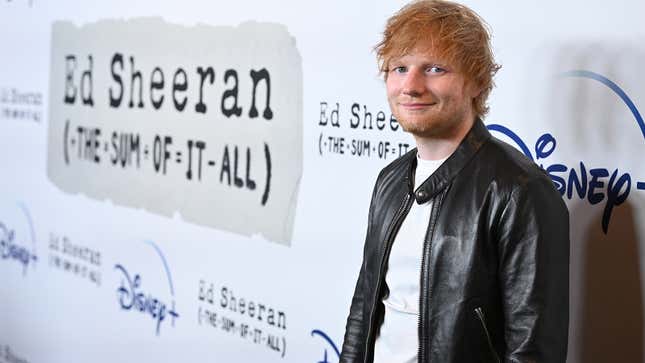What Makes Ed Sheeran Tick? Do We Care?
The four-part Disney+ documentary series Ed Sheeran: The Sum of It All outfits the pop star with a behind-the-scenes doc. It's predictably bland.
EntertainmentMovies

If you’re like me, at some point you wondered where Ed Sheeran came from. All of a sudden he was a thing, invading airwaves and weddings with his earnest odes and gently R&B-inspired white-guy pop. Sheeran is fine like a bland meal you didn’t pay for or a bath that was hot five minutes ago. And according to him in his new four-part Disney+ doc series, Ed Sheeran: The Sum of It All, his meteoric success felt like it came all of a sudden from his perspective, as well: “Before I knew it, I’d played over 40 countries and sold 9 million tickets on the [2017-2019] Divide tour. And that became 63 million albums sold worldwide,” he recounts.
Full of hooks and allergic to offense, Sheeran is the kind of artist that mainstream pop was made for. The only thing strange about him—aside from his insistence in rapping regularly in his music—is that he didn’t happen sooner. Sum is anchored to his 2022 Mathematics tour and the February of that year that found him enduring a series of hardships, but the David Soutar-directed doc zips back and forth throughout his career, touching on his troubadour beginnings, his relationship with his wife Cherry, and his triumphing over a childhood stutter that is reported to have set in after doctors neglected to anesthetize him before one of several treatments he received to remove a birthmark next to his left eye as a child. We learn in the doc that what got him over the speech impediment was his recitation of Eminem’s lyrics.
The Sum of It All, when it isn’t showing us footage of Sheeran alongside fellow superstars like Beyoncé (singing “Perfect” with him onstage in South Africa) or his aforementioned childhood hero Eminem (doing “Stan” at the Rock & Roll Hall of Fame Induction ceremony in 2022) or recording at the famed Abbey Road Studios, is determined to paint Sheeran as not just an everyman but an underdog. “I’m specky, ginger hair, really short, like, English from the countryside, who stutters and beatboxes,” he says. “That guy doesn’t become a pop star.” Well, yes he does. Or at least this one did. (If this amazes you, Sum might be just the nonfiction viewing you need in your life.)
-

-

-

-

-

-

-

-

-

-

-

-

-

-

-

-

-

-

-

-

-

-

-

-

-

-

-

-

-

-

-

-

-

-

-

-

-

-

-

-








































